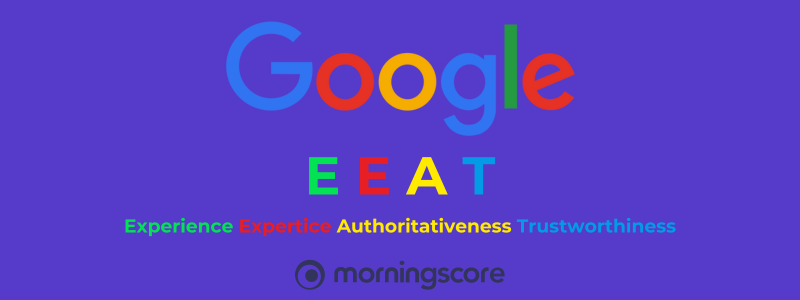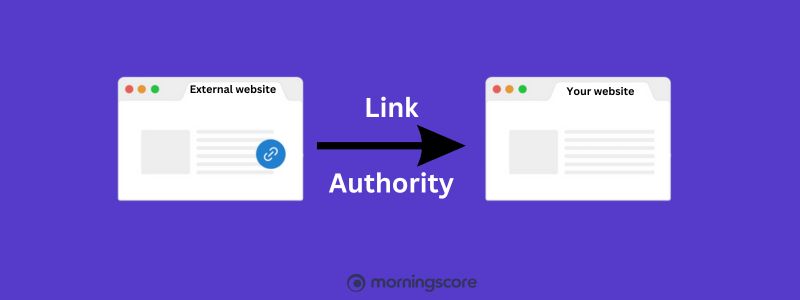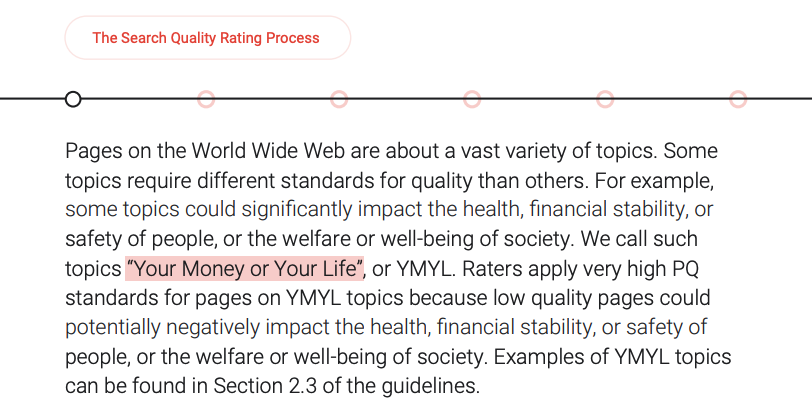Have you ever wondered why some websites perform better in Google’s search results than others? What makes Google trust some pages more than others?
The answer lies in a crucial concept: Google E-E-A-T.
E-E-A-T is more than just an SEO buzzword. It is one of the most important factors determining whether your content is perceived as credible and authoritative by both users and search engines.
Google tries to understand whether your content actually has value and credibility.
Imagine you are searching for health advice or financial guidance. Would you trust a random blog without references or knowing who the author is, or would you trust information from an expert with years of experience?
In this article, we dive into what Google E-E-A-T is, why it is crucial for SEO, and how you can implement and demonstrate these principles on your website.
What is Google E-E-A-T, and what does it stand for?

E-E-A-T stands for Experience (experience), Expertise (expertise), Authoritativeness (authority), and Trustworthiness (trustworthiness). Google uses these factors to assess whether content is reliable. Websites that demonstrate a high level of E-E-A-T get better rankings because they are perceived as credible.
Experience: Your experiences with a topic should be communicated in your content so users can see that the author is someone with firsthand experience with the subject. This can be done by having author biographies, directly referring to your firsthand experience in the content, or linking to “evidence” of your direct experience.
Expertise: Show your expertise and why your stance on the topic is relevant by creating comprehensive and thorough content, a comprehensive author biography, and by referring to and/or citing credible sources.
Authoritativeness: Build your personal brand and your company’s brand by continuously and consistently adding in-depth, relevant, and accurate content and being mentioned in relevant media and industry-related websites.
Trustworthiness: Be open about who the author is behind the content. Ensure you have clear and explicit contact information for both your company and the author, a well-optimized contact page, and generally follow ethical guidelines.
E-E-A-T is particularly important for YMYL (Your Money or Your Life) topics, such as health, finance, and legal advice. Google downgrades pages with low credibility, especially if they can negatively impact users’ lives, as businesses and websites in the YMYL category particularly can.
E-A-T was originally introduced in Google’s Search Quality Evaluator Guidelines in 2014. In 2022, Google added an extra “E” for ‘Experience’ to emphasize the importance of firsthand knowledge of the topic you are writing about, and thus it is called E-E-A-T today.
According to Google, pages that demonstrate practical experience are prioritized over those that merely reproduce theoretical information.
Why is E-E-A-T important for SEO?
E-E-A-T is important for SEO because it helps Google identify credible content. When Google evaluates a page, it looks at whether experience (Experience), expertise (Expertise), authority (Authoritativeness), and trustworthiness (Trustworthiness) are demonstrated.
For example, if a health website is written by a doctor with documented experience, Google will likely rate it as more credible than a blog without a medical background. A financial advisor with certifications will have a higher chance of ranking high than an anonymous writer without references.
Google’s primary focus is to provide users with the best and most reliable answers. Additionally, pages that appear authoritative can attract more links and further strengthen their position.
For many local businesses, there is also a geographic dimension. For example, a company in Roskilde that sponsors two local football clubs can obtain local links and show significant geographic credibility, which is important in local search results.
For example, an article from a reputable economic newspaper is linked to more often than a random blog post about investing.
In short: E-E-A-T helps build trust.
E-E-A-T is not a direct ranking factor, if we are to take Google’s own words for it.
At the same time, Google has the following statement
“For example, our systems give even more weight to content that aligns with strong E-E-A-T…”
So, E-E-A-T is, according to Google, not a direct ranking factor, but their systems place more weight on content that demonstrates these principles.
Is it a ranking factor after all? Judge for yourself.
E-E-A-T plays a significant role in the evaluation of YMYL content according to Google’s Search Quality Evaluator Guidelines. In other words, higher standards are set for pages that create content in the YMYL category.
How do you demonstrate experience in your content?
Google prioritizes content that shows firsthand knowledge. Use experience to create credibility:
- Include cases and examples based on your own experiences.
- Share customer reviews or expert statements.
- State the author’s background and experience in the subject.
For example, if you are investigating which lawyer you would like to have, you are actually looking for ordinary people who have experience with lawyers working in inheritance law.
A concrete example is a person who has a striking experience at a café in Rhodes, where they are served a gigantic 2-liter beer, and subsequently writes a negative review on Google. This review can deter others from entering the same place. Similarly, positive reviews can attract more. Firsthand accounts make the content more credible in Google’s eyes – and among consumers.
How do you show expertise in a subject?
Expertise is demonstrated through education, certifications, and documented knowledge.

Google values content written by specialists higher than content written by people without expertise in the subject. Here’s how to demonstrate expertise in your content:
- Link to credible sources and scientific studies.
- State the author’s qualifications for writing about the topic (e.g., “6 years of practical experience in digital marketing”).
- Use precise and technically correct phrasing.
- Show that the author has participated in conferences where they have presented professional lectures.
Example: An article about nutrition from a certified dietitian is prioritized higher than a blog without an expert background because the dietitian has expertise in nutrition.
How do you establish authority in your niche?
Authority is built over time through recommendations from other credible sources. Strong authority increases the chances of higher rankings. To strengthen authority:
- Get backlinks from reputable sites.
- Participate in interviews or guest posts.
- Cite recognized experts in your own content that support what you write.
For example, an article from a smaller site can significantly boost its authority if it is mentioned in a national media outlet like Berlingske with a link back. Similarly, an SEO guide from Moz ranks high because Moz has an established and significant authority in SEO, not just based on the quality of the specific page’s content.

Conversely, Intersport, which is an authority in sports equipment, will have great difficulty ranking on SEO-related topics where they have no authority.
How do you ensure credibility on your website?
Credibility is about transparency and accuracy. Google assesses credibility based on several factors:
- Use HTTPS to ensure data security.
- Include contact information, including CVR number, and a clear “About us” page.
- State sources and verify data.
- Avoid errors, both technical and linguistic.
It is crucial that you always document any claims with studies, research, or cases to increase your credibility. If you conduct your own studies, it is even better, but you can increase your own credibility by linking to other credible sites’ studies that support what you write.
How do you implement E-E-A-T in practice?

E-E-A-T is, for many, a loose and vague concept that does not say anything about how to implement best practices in practice.
Implement the E-E-A-T principle by:
- Including author biographies with the writer’s experience and expertise.
- Updating content regularly to ensure relevance and correct information.
- Using verified sources and citing recognized experts that support your content.
- Ensuring that users can verify the accuracy of the content by always stating sources.
- Working with topic clusters and covering all subtopics within the topics you work with or sell.
- Communicating your content on other channels besides your website, and getting others to cite and link to your content
For example, if you have a business that targets customers in Jutland or the Capital Region of Denmark, you can regularly ask them for a review, so you continuously get “social proofs” that strengthen your E-E-A-T profile.
How can topic clusters improve E-E-A-T?
Topic clusters are a structured way to organize content, where you have a comprehensive “pillar” article and several sub-articles that together cover a topic thoroughly. Topic clusters can help you to:
- Demonstrate experience: When you expand your content with concrete examples or cases within the topic, you show firsthand insights and practical experiences.
- Emphasize expertise: By covering all relevant angles of a topic (e.g., a “pillar” article on SEO with subtopics such as link building, technical SEO, content strategy, etc.), you signal that you are an expert in the field.
- Increase authority: A comprehensive “cluster” of texts that link internally to each other shows users – and Google – that you cover the topic broadly. Other pages will also be more likely to link to you if your page is considered the authoritative source.
- Strengthen credibility: By giving users a content universe where you answer all important questions, you appear as a thorough and transparent source.
A good example is a company that writes about carpentry and creates an overarching page on “Carpentry in Practice” with in-depth subtopics on roof construction, insulation, material selection, etc. This creates a solid framework for E-E-A-T by documenting knowledge in multiple layers.
How does Google evaluate E-E-A-T in its quality guidelines?
Google uses, among other things, real people, called search quality raters, to evaluate E-E-A-T. Their assessments train Google’s algorithm to better understand quality content based on real people’s views on a page both visually, content-wise, references, etc.
- Pages with high E-E-A-T get better ratings.
- Pages with low credibility get poorer placements.
- Pages without clear sources and verifiable information rank lower.
There are many methods to strengthen your quality, e.g., by thinking in internal links (or link building in general).
As more quality raters provide feedback, the algorithms are adapted to understand how good pages and good content are identified by people, so the automatic algorithms rank the best results at the top.
How does E-E-A-T affect YMYL (Your Money or Your Life) content?
Google sets stricter requirements for YMYL pages because misinformation can have serious consequences for individuals when it comes to health and financial topics. 
Misinformation about health topics can, in the worst case, have fatal consequences for individuals. Financial advice can, in the worst case, ruin a person. Therefore, there are high requirements for expertise, experience, authority, and credibility to rank in search results.
To rank better:
- Use verified expert statements.
- Hire documented professionals to write your content
- Avoid speculation and unfounded claims.
- Refer to public studies and research via links.
- Get other industry-related pages to link to your content.
- Ensure that authors have relevant backgrounds.
Example: Health-related content written by a doctor or other health or medical professional increases the content’s credibility. It is important to link to the given person’s “about” page, which thoroughly describes the person’s experience and expertise, or to their practice as documentation of the author’s health background.
Don’t create content to rank in Google; create your content because it should be there for many years and create value for your users.
It is important to note that the E-E-A-T principles do not only apply to YMYL pages but, to the widest extent possible, include all websites because Google has found that firsthand experiences with a topic are key to having experience with the topic.
Therefore, it applies to everyone, but especially health and financial security have particularly high requirements, but travel guides, product reviews, technical “how-tos,” etc., should also follow the principles.
How do you measure the effect of E-E-A-T on SEO?
E-E-A-T is principles that cannot be measured directly in search results or in your organic placements.
According to Google, E-E-A-T is not a ranking factor, and therefore its effect can be difficult to measure directly.
You can try to measure how well your pages perform by comparing your current rankings with future rankings after specialists or experienced individuals with expertise in your topic have rewritten your content.
Look at:
- Organic traffic and keyword rankings (e.g., if there is an increase in rankings of over +30% after you have improved the content).
- Backlink quality and mentions from authoritative sites.
- User engagement and session time.
For example, if you have your content rewritten by an industry expert and start attracting links from highly specialized sites, you can often see a clear positive effect over time.
Summary
Google E-E-A-T improves SEO by increasing credibility and authority.
Websites that follow E-E-A-T principles are prioritized higher by Google than websites that do not implement E-E-A-T principles.
Implement E-E-A-T by focusing on experience, expertise, authority, and credibility in your content.
Follow Google’s guidelines and use verifiable sources to strengthen your website’s visibility and user trust.
In summary: Make sure to incorporate your personal experiences with the topic you are writing about, highlight your qualifications for writing about the topic, always refer to sources in your content, and ensure that industry-related pages link to your content.
FAQ
Is E-E-A-T only relevant for large companies or well-known brands?
E-E-A-T is relevant for everyone, regardless of the company’s size or industry. Even startups can benefit from being clear about their experience, expertise, authority, and credibility. This can be done, for example, by documenting the authors’ professional background, explaining any certifications, and providing transparent information about the company (CVR number, contact information, etc.). In this way, even smaller websites can appear credible in Google’s eyes.
How do you handle E-E-A-T if you use AI-generated content?
AI-generated content can be a great help, but it requires human post-processing to achieve high E-E-A-T. Ensure that a professional or experienced writer reviews and validates the text so that any errors or incorrect information are corrected. Add credible sources and highlight the author’s experience and professional background. This way, the content becomes both high-quality and credible, even if AI has been involved in the process.
What mistakes harm a website’s E-E-A-T the most?
Typical mistakes include lack of information about authors, no clear sources for important claims, and poor site technique (lack of HTTPS, incorrect contact information, “dead” links, etc.). Incomprehensible or deliberately misleading articles without references signal low credibility. Another common mistake is publishing content about highly specialized topics without having the necessary knowledge or experience, which makes users (and Google) doubt the content’s validity.
Can you build E-E-A-T if you are new to the market without a reputation?
Yes, but it requires a focused effort. A new website or company should start by publishing well-researched content that reflects your practical experience or professional knowledge. Seek collaborations with others in the industry, e.g., in the form of guest posts, interviews, or references from recognized sites. Credibility is built over time, so it is important to be consistent with quality and documentation from the start. And yes, you can rank on Google even if you don’t have a reputation and are new to the field. You can even see results with SEO in just 3 months, if you do it right.
How can you ensure continuity in E-E-A-T when multiple authors contribute to the site?
It is a good idea to have clear internal guidelines so that all authors know how to document sources, experience, and professional expertise. Create individual author pages, if necessary, where each writer is presented with background and specialties. Also, ensure a fixed editorial process so that there is always someone quality-checking for consistent standards for language, sources, and formalities. This way, the website appears credible and professional, even if multiple different people contribute.

